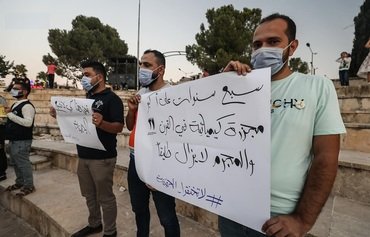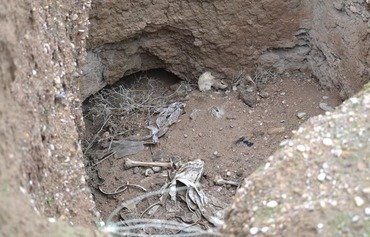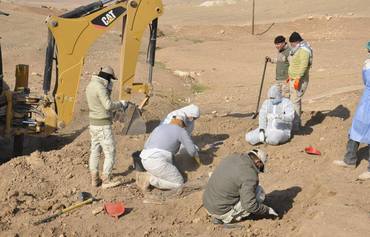Syrian regime teams have been exhuming the remains of victims of a 2013 sarin attack on the Eastern Ghouta town of Zamalka and moving the bodies to unknown locations, a local activist told Diyaruna.
The relocation of bodies appears to be part of an effort to conceal all traces of the nerve agent attack to avoid accountability, in the event of an expansion of the international investigation into the attack, activist Mohammed al-Beik said.
A team of UN investigators in September 2013 announced it had found "clear and convincing evidence" that sarin gas was used in an August 21st, 2013 incident in the opposition-held enclave of Eastern Ghouta, outside Damascus.
It was not in the team's mandate to determine who was responsible for the attack, which has been widely blamed on the Syrian regime.
![UN chemical weapons specialists inspect soil samples in Zamalka after an alleged chemical attack which killed hundreds of civilians. [Photo courtesy of Mohammed al-Beik]](/cnmi_di/images/2018/08/21/14126-Chemical-weapons-specialists-600_384.jpg)
UN chemical weapons specialists inspect soil samples in Zamalka after an alleged chemical attack which killed hundreds of civilians. [Photo courtesy of Mohammed al-Beik]
"Syrian regime security teams have, since August 10th, encircled the public garden in Zamalka, which had been turned into a mass gravesite following the attack," al-Beik told Diyaruna.
The gravesite contains the remains of the victims of the sarin attack on the town, in which more than 1,000 people were killed.
Regime medical teams have been examining the bodies at the gravesite, al-Beik said, before transporting bodies of the victims to an unknown location.
"Trucks also have been seen in the area, moving soil from the site and replacing it with soil brought from another site on the outskirts of the city," he said.
Remaining activists questioned
According to al-Beik and the Syrian Observatory for Human Rights, regime teams have detained the last remaining activists, paramedics and officials in charge of the gravesite in order to question them about the 2013 attack.
The teams were compiling a list of names of those killed in the attack and where they were buried, as well as a list of those who had suffered injuries, he said.
Few opposition activists and paramedics remain in the area to be questioned, however, as most opted to the leave the area when regime forces entered.
Al-Beik noted that the area where the gravesite is located has been subjected to shelling and airstrikes more than once in recent years during ongoing fighting.
There is talk in Zamalka that the regime is preparing to erect a building at the site "to conceal any trace of the attack", as it did in the city of Douma, he said.
In Douma, the bodies of the victims of an April 7th chemical attack were moved to an unknown location, he said, and a building was constructed on the site of the attack, which has been turned into a memorial garden.

![This photo shows part of the gravesite where victims of the alleged chemical attack in Zamalka were buried. [Photo courtesy of Mohammed al-Beik]](/cnmi_di/images/2018/08/21/14125-Zamalka-mass-gravesite-600_384.jpg)






